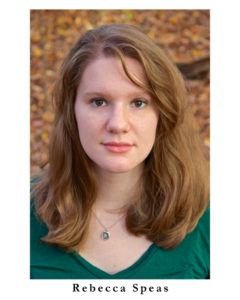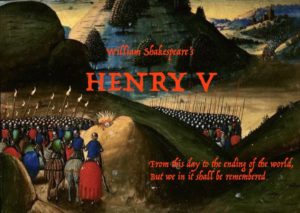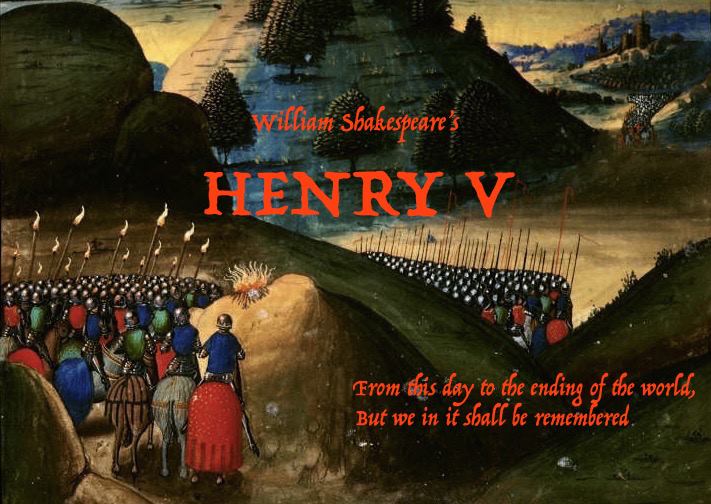Once more into the breach, dear friends, once more! But what if it’s your first time into the breach, like it is for Director Rebecca Speas, who’s taking Henry V out for her first full-length directorial debut? Or you’re newcomer Allison McAlister fresh to the Maryland theatre scene by way of North Carolina and delving into the titular role of the show? In a TheatreBloom exclusive interview, we sit down with Rebecca and Allison to get an idea of what muses stoke their fire when it comes to the Bard and his great history lesson.
Thank you both for sitting with us, if you could give us a brief introduction as to who you are, what you’re doing with the show, and what people might recognize of your work in the area, we’ll get going!

Rebecca Speas: Hi, I’m Rebecca Speas and I am the director of Henry V. This is my first full-length directing experience. A had a little experience directing in college for my thesis, but I’m mostly an actor. I just finished with Over Her Dead Body with Pinky Swear Productions for Capital Fringe Festival.
Allison McAlister: I’m Allison McAlister and for this production of Henry V, I’m Henry V, which is super exciting. I’m incredibly honored that people trusted me to do this. I’m fairly new to the Maryland area. I was fairly involved with community theatre, some Shakespeare groups, and some other professional theatre groups back in North Carolina. I lived in Raleigh for about ten years, most recently in High Point for about six months. And now I’m here.
What was the appeal to want to jump off the deep-end and direct Henry V as your full-length directorial debut?
Allison: She’s a masochist.
Rebecca: Clearly! Accurate. Honestly? The instigating factor was that The Rudes had never done it, which was kind of shocking. They’d done the Henry VI’s and they did the Henry IV’s just before this production, but never Henry V. I’ve always been fascinated by Henry V because Henry IV parts I & II are my favorite Shakespeare plays. This is the continuation of that story. For a long time, I was very not on team Henry. But as I’ve gotten older and I’ve read more and have figured out what is going on, I’ve grown a lot more fascinated with the character and his arc. Partly out of necessity but also partly out of my fascination and love of this story and these characters.
How did you end up with Henry V, Allison?

Allison: I was on Facebook. I was looking for a way to be involved in a theatre community of some kind. I saw a Facebook post that said this company was doing auditions for Henry V and that they do gender-blind casting, which may mean whatever that means. I have always loved the character of Henry V. I have always loved this “Hal to Harry” arc. I’ve always loved that development and I have always thought, “Man, I wish I could portray one of the Henry’s one day.” So I figured I would come out and try it. And now here I sit. In spite of myself, I actually have no idea what I did. But they are quite an undertaking, even just to sit through.
I understand, though, that when The Rudes do Shakespeare, even with the histories, there tends to be quite a bit less to sit through?
Rebecca: That’s right. There’s no six-hour duration where everyone’s in Elizabethan garb and it goes on forever.
Allison: Delivered with judicious cuts.
Rebecca: Yes. Now, nothing plot-critical, but definitely cuts.
Speaking of which, what has been your overall vision approaching this beast of a V, as it were?
Rebecca: As an actor and as a director I always start with the text. Henry V opens with the chorus coming out and the “Oh for a muse of fire”, that whole speech that boils down to ‘we can never do this story justice in the theatre so you’re going to have to trust us and you’re going to have to help us.’ You’re going to have to imagine that all of these actors are playing ten different parts, and you’re going to have to imagine that the Battle of Agincourt is happening on stage when obviously it isn’t. By nature, it’s the most performative of Shakespeare’s plays, I would argue even more than The Tempest. I went from there. I threw any pretense of realism or binding it down to a particular time period out the window because it just wasn’t interesting to me for this play. I’ve went to “what are the words that they’re saying?” How can I make those words and the relationships between all these characters the focus of the story? That was my starting point and it has sort of gone from there with simplicity being the rule at the end of the day.
What would you say have been the challenges in working with this production?
Rebecca: Mine is an easy answer. It’s all the administrative stuff has been super hard. There are so many people in the history plays. Getting them all in one room at the same time, figuring out where they are at any given point, and just fitting all those puzzle pieces together, that has been my biggest challenge.
Allison: Specifically, being a woman playing a role that is not played by a woman, and it’s not specifically a gender-flipped production or anything like that, but honestly? It hasn’t really been a thing, which seems strange, I’m sure, but it really hasn’t been a thing. There’s been no point— or maybe there is and Rebecca just hasn’t told me— but there’s been no point where I’ve been thinking, “Oh dear, I need to be less of a woman.”
Rebecca: No, there hasn’t.
Allison: That’s not really part of it. That’s not part of Henry’s arc in this. It’s very developing how he comes to be accepted as a leader. And as a person. But you don’t see much that’s actually masculine specific. This is really interesting compared to Henry IV, when you see him as Hal, whose living it up in the brothels and all that. He’s very, very masculine whereas here it’s less “he’s a man” as opposed to not being feminine, but more “he’s a king” and growing into that.
Rebecca: That was very eloquently put, I could not have put my finger on that, but you’re absolutely right.
Allison: Actually that was some gibberish.
Rebecca: I’m buying it.
You both keep mentioning this fascinating story arc of Hal to Henry. What is it about that story arc that you are bringing of yourself to and he is bringing to you?
Rebecca: Oh, that’s a tough one for me, do you want to answer first?
Allison: I think there’s a temptation to make it just about growing up in a chronological sense? But I think everybody, no matter how old you are, you’ve had this sense of really coming into where you are at some moment in your life. I think that’s what it is, it’s a lot of feeling that sense of coming into your own. He comes into this as Hal. His father has just died and his father took the throne less than ceremoniously. He’s coming to terms with the fact that “oh my gosh, my father was not necessarily a good man.” And “aw, man, now I have a kingdom, oh geez.”

We’ve all had these experiences where we’ve been asked to be something that we don’t see ourselves as being. There is this point at which you have to decide are you going to bow out or are you going to just fake it until you make it? And at some point you’re not faking it anymore. That’s the piece that I see. The good thing that William Shakespeare gave Hal was this ability to be charismatic and to lead people, even if it wasn’t in a great direction. It’s so much better having that charismatic construction to work with, or to have some sort of understanding as to how he’s pulling people along for the ride. It’s been really fun to explore. There’s a particular moment that I’ve decided for myself— because he kind of falls into being king a couple of times but then gets scared— so there is this moment that I, as Allison in my portrayal of Henry, have decided is where we say “Oh, we are actually going to be king now.” I hope that comes out somewhere.
Rebecca: That’s awesome. In my relationship with this play, as I previously said, I was team Falstaff for a very long time during Henry IV. I had played Falstaff as a teenager and had sort of related to the “devil my care” attitude and living the good life because you only live once sort of thing. So when Hal banishes Falstaff at the end of Henry IV Part II, I felt very betrayed as Falstaff. This person, even if he isn’t a good person, had supported you in so many ways and you’re throwing him out. As I got older and was growing up—
Allison: You were growing into the Rebecca you were meant to be.
Rebecca: And the Rebecca that I wanted to be! Exactly. But I had a very similar experience watching and reading Henry V. It’s about a man growing up, but he has to become his own person on this international scale. It’s about growing up and not necessarily liking the person that you’re becoming. You have that moment where you have to choose. Am I going to be the king who storms into Harfleur raping and pillaging it and burning it down? Or do I use mercy to them all? What kind of person am I going to be? Because I’m going this way and I don’t know if I like what’s at the end of that road. I think everyone has that kind of crossroads moment, and that is what rang true to me this time around. Who knows what I’ll find in Henry V ten years from now.
Is there a moment that defines the show for you?
Rebecca: Ooh. That’s a really good question. I have to think about that for a minute. Right now I think it’s the moment with Henry and the soldiers. Henry has disguised himself and is walking around the camp before the big battle of Agincourt where the English are all almost certainly all going to die. He’s posing as a common man and three soldiers speak truly about what they think about being in the middle of this French field about to die and they do not like it.
Allison: Undercover boss.
Rebecca: Yeah, exactly! This is undercover boss episode of Henry V. Those interactions between Henry and Michael Williams are the crux of Henry’s decision later. He has that one line— and you know it and I don’t— “every subject’s duty…”
Allison: Every subject’s duty is the king’s, but every subject’s soul is his own.
Rebecca: I think he realizes he can let that responsibility go. He has their duties but he doesn’t have their souls and I think that is a big releasing of a lot of his angst. Not all of it, because I think a lot of it is still there, but a great deal of it.
Allison: I think my moment for defining the show, the moment for Henry that I’ve paid the most attention to, which sounds terrible to say, but the moment of climax of the arc for me is right after that.
Rebecca: I knew that was exactly what you were going to say! And it was actually what I was going to say but I knew you were going to say it and I didn’t want to steal your thunder.
Allison: I think it’s a good sign when two people define the show at the same place, right? At least for the actor and the guy who’s name is in the title?
Rebecca: Yeah. Because Pistol probably has a whole different defining moment for this show.
Rebecca: For Henry’s decisions, and honestly I guess the shape of the show, there’s this incredible moment right after what Rebecca has just described. After the king has gone around and done the undercover boss thing, he has this incredible moment of aloneness. And this was just an incredible direction that Rebecca gave me. We’re rehearsing monologues and she says, “I’m just going to walk out of the room. And you’re going to be completely alone. And that’s where Henry is when he does this.” For the whole show it’s about Henry saying “What’s he going to do” but people are always with him saying “What are you going to do?” And then everyone has left. There is a decision point there. There is this confrontation, for the folks who are familiar with Henry IV, of all that came before. And there is this acknowledgement of all the weight that all of this carries. As far as somber moments go? That’s a large defining one and it really solidifies the direction of the second act of the show.
Other than the judicious cuts to the script, what is different, unique, or special about your production? What might people expect from this Henry V?
Rebecca: The beginning is different but I don’t want to tell you how because that will be a spoiler. Structurally I’ve made a few tweaks. Hmm. I hesitate to say that it’s super new or revolutionary because it’s not. There’s not a whole lot of bells and whistles beyond what our actors can do with their voices and their bodies. I really enjoy that and I think it suits this play in particular because the audience is so complicate in the telling of the story. The chorus comes out at every act and says “here, take my hand, and let’s go.” They’re going to take you along this story and we’re all going to have a good time. I want it to feel like you’re being told a really good story and you get lots in it for a couple of hours. That might not necessarily be a new approach, but its enjoyable.

Allison: I love the fact that the audience is a part of this. Where else do you get to go sit and be part of the French army or part of the English army? You get to be an English noble if you choose to be. It’s wonderful. I have not spent a lot of time in the venue, yet, but I am very excited to be working on this thrust stage.
Rebecca: We’re back at GAC (Greenbelt Arts Center) so we’ve got the thrust back!
Allison: I’ve heard the stories and songs of performing at GAC.
Rebecca: Every space has its quirks; every rose has its thorns.
Allison: I love the fact that the audience really is right there, or those who choose to be. Those who choose to sit further back that’s okay too, but those who choose to sit right there are going to get spoken at and engaged with, I’m very excited about that.
What do you think people are going to take away from this production of Henry V?
Allison: Hopefully it won’t be “Hmm, snooze, Henry V.”
Rebecca: Oh yes, fingers crossed! What I would love for people to take away from it is that once all the spectacle and the rip-roaring yarn has happened, I would like people to take a closer look at how we define our heroes. Everyone says history is written by the winners, which is accurate, but there are a couple of things that we do in this show that poke a little at the winners. Henry is a flawed person and a lot of times he is not presented that way. What Henry V does so well is that because it’s being told to you by a chorus, it shows you that “yes, this is a story, but how we’re telling it might not necessarily be all that actually happened.” This is just the “everything’s coming up roses and Henry” edition. We put everyone up on a pedestal whether they deserve to be there or not. And I want people to take a closer look at that.
Allison: There is an incredible self-awareness of the text, which I love. I think what I’m taking away from this exploration of it is that people are people. People can be kings and kings are people. And everything in-between, and there isn’t even an in-between. It’s just people are people. I could say that again but that’s what’s coming away from this for me and I hope that the audience gets that experience too.
What has working on this project taught you about yourself as an actor, as a director, as a human being?
Allison: Hmm. It’s really taking me back to those moments when I didn’t realize I was qualified for something. In concrete terms that is one of the biggest things that it has brought me back to. Honestly, moving up here was different and the fact that these two things are occurring roughly around the same time period in my life is really interesting. Growing into a new neighborhood, a new space, a new career path at the same time of growing into Henry is really curiously informative in both directions. In a concrete way that’s what’s going on there. In an abstract way I am just loving seeing the different facets of people. This is going back to the people are people thing. With this show, we’re choosing to let all the characters be people, as opposed to Exeter being just some guy who says “everybody move!” We’re not making this person this singular demonstration of humanity, everybody gets to be all of it.
Rebecca: That’s actually really great to hear. Because this is my first time directing, both in a long time and with it being my first full-length time— and I did not have a lot of prep time as I was coming right out of Fringe so the timeline got smushed a little bit— I think it’s shown me that even if I’m not qualified, I have to be when I’m in the room. I have a responsibility to the people in the room to make work there. I can’t get caught up in all of my anxieties. A lot of times before rehearsals I’d be having these moments of, “Oh my God, I don’t know what I’m going to do today. Can I block an entire act in two hours? Can I do this monologue with this person I don’t know what I need to say to them.” But in the room, all of it shut off. I had the people in front of me, I had the work I needed to do. It just taught me to really knuckle down and people will show up for you. If you expect it of them people will show up, which has been an invaluable lesson and I applaud everyone in the show because I did not make it easy. You can trust the people in the room with you, that is a very valuable experience.
Allison: People are capable of such remarkable things.
Rebecca: So many actors in this cast from first read to now have just made incredible choices and incredible leaps that I didn’t even need to poke out of them. They just happened and I was like “That’s perfect! Do it all the time!” I’ve also really enjoyed that because I have a fairly collaborative process and I was really able to enjoy it this time around.
If you had to sum up the experience to this point in one word, what word would that be?
Rebecca: Breakneck!
Allison: One word…
Rebecca: Gaah! That’s actually my word.
Allison: Is that actually a word?
Rebecca: It’s a sound…
Allison: Hmm. Oh dear. I say so many in the show. I think any word I come up with is going to be insufficient and as soon as I leave I’m going to be like “No! That was it!” I apologize! This is a tough question. Thrilling. We’re going with that. Thrilling.
Why do you want people to come and see Henry V?
Rebecca: To see the amazing work that all of these actors and designers have done. It’s going to be very remarkable.
Allison: We were just discussing today that William Shakespeare wrote this fantastic thing that is still funny, poignant, and relevant 400 years later. Cant’ do much better than that.
Rebecca: There is so much heart in this show that I think a lot of times gets lost. I did my best to make sure that we didn’t lose it. I think there’s a lot of it in this show.
Allison: You will not be yelled at by Henry V and the chorus the entire time.
Rebecca: Yes, none of this “I AM SAYING WORDS TO YOU!” because “ACTING!” stuff.
Henry V runs through September 10, 2016 with The Rude Mechanicals at Greenbelt Arts Center— 123 Centerway in historic Greenbelt, MD. For tickets call the box office at (301) 441-8770 or purchase them online.




